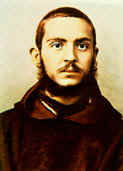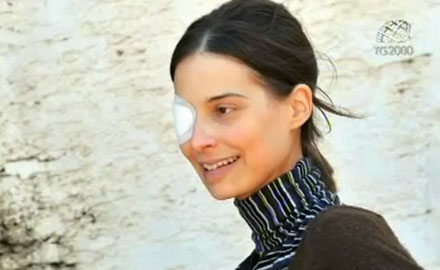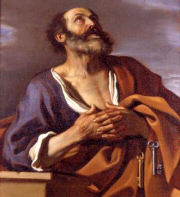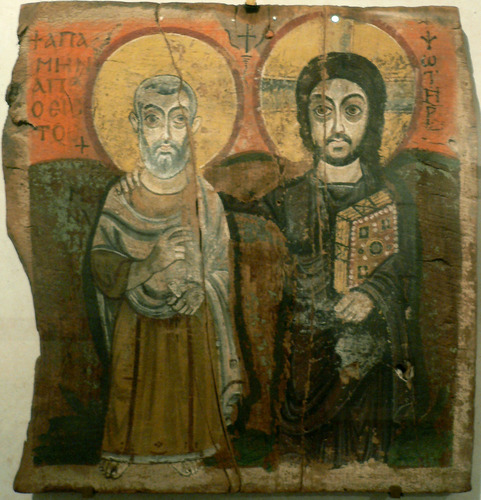SAINT PADRE PIO AND BILOCATION

Bilocation
|
Bilocation can be defined as the simultaneous presence of a person in two different places. Numerous witnesses connected to the Christian religious tradition have reported events of bilocation, which have been attributed to many Saints. Padre Pio had this charisma and had been seen by eyewitnesses in different places at the same time. Here are several testimonials.
Mrs. Maria, one of Padre Pio’s spiritual daughters, said that one evening her brother was praying when suddenly he fell asleep. He was immediately awoken by a slap on his right check. He realised that the hand which hit him was covered with a half glove. He suddenly thought of Padre Pio. The next day he asked Padre Pio if he had slapped him. Padre Pio answered; “this is the way to cast away sleeping while praying?” With a slap Padre Pio had “awakened” the attention of the praying man.
|
 One day, a former Italian Army Officer entered the sacristy and watching Padre Pio said; “Yes, here he is! I am not wrong!” He approached Padre Pio, and kneeling in front of him crying, he said; “Padre, thank you for saving me from death.” Afterwards, the man told the people present there, “I was a Captain of the Infantry and one day on the battlefield in a terrible hour of battle, not far from me I saw a friar who said; ‘Sir, go away from that place!’ I went towards him and as soon as I moved, a grenade burst in the place where I was before and opened a chasm. I turned around in order to find the friar, but he was not there anymore.” Padre Pio, who was bilocating, had saved his life. One day, a former Italian Army Officer entered the sacristy and watching Padre Pio said; “Yes, here he is! I am not wrong!” He approached Padre Pio, and kneeling in front of him crying, he said; “Padre, thank you for saving me from death.” Afterwards, the man told the people present there, “I was a Captain of the Infantry and one day on the battlefield in a terrible hour of battle, not far from me I saw a friar who said; ‘Sir, go away from that place!’ I went towards him and as soon as I moved, a grenade burst in the place where I was before and opened a chasm. I turned around in order to find the friar, but he was not there anymore.” Padre Pio, who was bilocating, had saved his life. |
Father Alberto, who met Padre Pio in 1917, stated “I saw Padre Pio standing in front of the window, looking at the mountain. He was speaking to himself. I approached him in order to kiss his hand, but he did not notice my presence and I noticed that his hand was rigid. At that time, I heard that he was clearly giving absolution and pardon to someone. After a while, Padre Pio shook like awakening from a nap. He looked at me and said; ‘you are here. I did not realize it!’ After some days, a telegram from Turin was delivered. Someone was thanking the superior of the convent for having sent Padre Pio to Turin to assist a dying person. I realized that the man was dying in the same moment Padre Pio was blessing him in San Giovanni Rotondo. Obviously, the superior of the convent had not sent Padre Pio to Turin, but he had bilocated there.”
|
In 1946, an American family went from Philadelphia to Saint Giovanni Rotondo in order to thank Padre Pio. In fact, their son, a bombardier plane pilot (during World War II), had been saved by Padre Pio in the sky over the Pacific Ocean. The son explained; “the airplane was flying near the airport on the island where it was going to land after it had loaded its bombs. However, the airplane was struck by a Japanese attack plane. The aircraft exploded before the rest of the crew had the chance to parachute. Only I succeeded in going out of the airplane. I don’t know how I did it. I tried to open the parachute, but I didn’t succeed. I would have smashed to the ground if I had not received a friar’s help who had appeared in midair. He had a white beard. He took me in his arms and put me sweetly at the entrance of the base. You can imagine the astonishment inspired by my story. Nobody could believe it, but given my presence there, they had no choice. I recognized the friar who saved my life some days later while on home leave, I saw the monk in one of my mother’s pictures. She told me she had asked Padre Pio to look after me.”
|
A woman was at her daughter’s home in Bologna. She had a tumor in her arm. So she agreed with her daughter to go for surgery. The surgeon told her to be patient and to wait some days before establishing a date for the surgery. In the meanwhile, her son-in-law sent a telegram to Padre Pio asking him to pray for his mother-in-law. At the moment when the telegram reached Padre Pio, the woman, who was in the dinning room alone, saw a capuchin friar enter through the door. “I am Padre Pio of Pietrelcina,”he said. Then, after asking her what the doctor had said and encouraging her to trust in Our Blessed Mother, he made the sign of the Cross on her arm and went out of the room. At that point, the woman called for the maid, her daughter and son-in-law. She asked them why they allowed Padre Pio to enter without announcing him. They responded that they had not seen Padre Pio and furthermore, they had not opened the door to anyone. The next day, the surgeon did a medical check-up on the woman in preparation for surgery; however, he could not find any tumor.
|
Padre Pio visited the Bishop who had ordained him on the 10 August 1910 in the Cathedral of Benevento. It happened before the Bishop’s death. Padre Pio bilocated there in order to give the Bishop his spiritual support.
|
Even Blessed don Orione spoke about padre Pio’s bilocation. He said: “I was in Saint Peter’s Church in Rome in order to attend the celebration of Saint Teresa’s beatification. There also was Father Pio, despite the fact that he was in his convent at the same time. I saw him. He was smiling and coming towards me through the crowd, but when I was not far from him, he disappeared.
|
In 1951, Father Pio celebrated Holy Mass for a convent of nuns in Czechoslovakia. After Mass, the nuns went to the sacristy to offer Father Pio coffee in order to thank him for his unexpected visit, but they did not find the holy man in the sacristy. Thus the nuns realised that Father Pio had bilocated there.
|
In 1956, Padre Pio served Holy Mass for Joseph Cardinal Mindszenty of Hungary in his Budapest prison. Someone who had news of the imprisonment had asked Father Pio directly: “Father Pio you have served the Mass to the Cardinal of Hungary, so you have spoken to him! So you have been in jail with him and you have seen him!” - Father Pio answered: “Of course, if I had spoken to him I have also seen him”. He was bilocating.
|
Mother Speranza, who founded the order of the Handmaids of the Merciful Love, said she had seen Padre Pio every day for one year in Rome. He had bilocated there. We know that padre Pio had never been to Rome, except once in 1917, in order to take his sister to a convent she had decided to enter..
|
An Italian General of the Army, called Cadorna, felt in such condition of depression after the defeat of Caporetto, that he was contemplating suicide. One evening he went to his room and he commanded his orderly not to allow anybody to come in. He took his gun from a drawer and pointed the gun at his head, but suddenly he heard a voice: “Oh General, why do you want to do such stupid thing?” The voice and the presence of the Friar helped the general change his mind. He wondered how it was possible that a Friar had entered his room. He asked for explanations from his orderly but he answered he had seen nobody going into his room. Some years later, the General read in a newspaper of a Friar that worked miracles in the Gargano area. He secretly went there but he was astonished when father Pio said to him: “Hello General, you ran a great risk that evening, didn’t you?”
|
Father Agostino wrote: “A Nun, in Florence, told me after the communion Padre Pio had appeared to her to comfort her and to bless her. So I wanted to ask to Padre Pio.
I told him: "Do you do some trips to Florence from time to time? " "A nun has told this to me."
"Yes, I do, Father" He humbly said me.
It was clear Padre Pio had gone to Florence in bilocation
|
The last bilocation of Padre Pio occurred the afternoon before the day of his death. Padre Pio has gone to greet in Genova (Italy) the brother Umile who was wounded.
Around 16.30, in September 22nd , in 1968 Sister Ludovica goes to father Umile to bring him a cup of tea. The religious feels a strong perfume of flowers that floods the whole environment. Since she doesn't know the origin of the perfume she looks at the monk for an explanation.
Father Umile with naturalness and spontaneity says: "Padre Pio has come to greet me and he has given to me his last goodbye."
The following day the news of the death of Padre Pio spreads around the World.
|
Padre Placido Bux of Saint Marco in Lamis said:
"In 1957, I was brought to the Hospital of San Severo for a serious hepatic problem. During the night I could see Padre Pio near my bed. He spoke to me and he reassured me about my healing. Then Padre Pio desappeared throught the window by putting his hand on the glass of the window. The morning after Padre Placido felt better and he woke up and he went to the window. He recognized the print of Padre Pio's hand on the glass so he realized it was not a dream. This news was spread within the Hospital in few time and also in the town.
A lot of people went into the room in order to check the window by themselves and despite the glass had been cleaned with water a lot of time, the print was still there.
The priest of the Church of San Severo, Padre Alberto, decided to go first to the Hospital in order to pay a visit to Padre Placito and then to Saint Giovanni Rotondo to meet with Padre Pio.
As soon as Padre Alberto was in the corridor of the Convent he saw Padre Pio in front of him and before Padre Alberto could say anything Padre Pio asked for news about Padre Placido's health condition.
Then Padre Alberto said: "Father, everyone believes you have been in hospital last night to pay a visit to Padre Placido and you have left the print of your hand on the glass of the window..."
Padre Pio said: "Do you have any doubt?"
|













